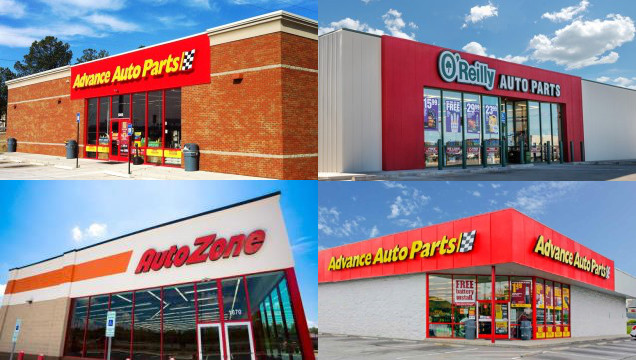
CHICAGO—The American auto industry has undergone a revival, but the number of older cars on the road continues to increase, and that is good news for auto parts stores. Competition for properties in this sector keeps getting more intense, and this will likely continue in the near future.
Cap rates for the single tenant net leased auto parts stores decreased by 8 bps from the fourth quarter of 2015 to the fourth quarter of 2016 to 5.9%, according to a new study just released by the Boulder Group, a net lease firm in suburban Chicago.
The decline in cap rates for the auto parts store sector slightly outpaced the overall net lease retail market which compressed by 6 bps over the same time period. Boulder examined sales activity among properties occupied by Advance Auto Parts, AutoZone and O'Reilly Auto Parts as the three account for the highest percentage of single tenant transactions.
After just a slight drop over the past year, cap rates for Advance Auto Parts now stand at 6.38%, but rates for AutoZones compressed 20 bps down to 5.55%, and O'Reilly outlets compressed 16 bps to 5.52%. Boulder attributes the higher rate on Advance Auto Parts properties to its higher supply of older stores on the market.
“As Americans continue to increase the length of car ownership and the average age of vehicles on the road increases, the retail auto parts industry continues to thrive as the market for auto repairs and aftermarket parts becomes more necessary,” Boulder notes.
A recent report by IHS Markit, finds that the average age of vehicles on the road has increased to 11.6 years. Furthermore, the same report found that the segment consisting of the oldest vehicles on the road is increasing at the fastest pace. IHS Markit expects the segment consisting of vehicles older than 16 years to grow by 30% to 81 million by 2021.
“Transaction volume in the auto parts sector should remain active as investors continue to seek properties with investment grade tenants at lower price points,” according to Boulder. “Additionally, the fundamentals of the retail auto parts industry make these properties attractive to varying investors. Recently constructed properties with long term leases should continue to be in the highest demand as these assets are the most sought after amongst 1031 buyers due to their lease term duration.”

CHICAGO—The American auto industry has undergone a revival, but the number of older cars on the road continues to increase, and that is good news for auto parts stores. Competition for properties in this sector keeps getting more intense, and this will likely continue in the near future.
Cap rates for the single tenant net leased auto parts stores decreased by 8 bps from the fourth quarter of 2015 to the fourth quarter of 2016 to 5.9%, according to a new study just released by the Boulder Group, a net lease firm in suburban Chicago.
The decline in cap rates for the auto parts store sector slightly outpaced the overall net lease retail market which compressed by 6 bps over the same time period. Boulder examined sales activity among properties occupied by
After just a slight drop over the past year, cap rates for
“As Americans continue to increase the length of car ownership and the average age of vehicles on the road increases, the retail auto parts industry continues to thrive as the market for auto repairs and aftermarket parts becomes more necessary,” Boulder notes.
A recent report by IHS Markit, finds that the average age of vehicles on the road has increased to 11.6 years. Furthermore, the same report found that the segment consisting of the oldest vehicles on the road is increasing at the fastest pace. IHS Markit expects the segment consisting of vehicles older than 16 years to grow by 30% to 81 million by 2021.
“Transaction volume in the auto parts sector should remain active as investors continue to seek properties with investment grade tenants at lower price points,” according to Boulder. “Additionally, the fundamentals of the retail auto parts industry make these properties attractive to varying investors. Recently constructed properties with long term leases should continue to be in the highest demand as these assets are the most sought after amongst 1031 buyers due to their lease term duration.”
Want to continue reading?
Become a Free ALM Digital Reader.
Once you are an ALM Digital Member, you’ll receive:
- Breaking commercial real estate news and analysis, on-site and via our newsletters and custom alerts
- Educational webcasts, white papers, and ebooks from industry thought leaders
- Critical coverage of the property casualty insurance and financial advisory markets on our other ALM sites, PropertyCasualty360 and ThinkAdvisor
Already have an account? Sign In Now
*May exclude premium content© 2025 ALM Global, LLC, All Rights Reserved. Request academic re-use from www.copyright.com. All other uses, submit a request to [email protected]. For more information visit Asset & Logo Licensing.








